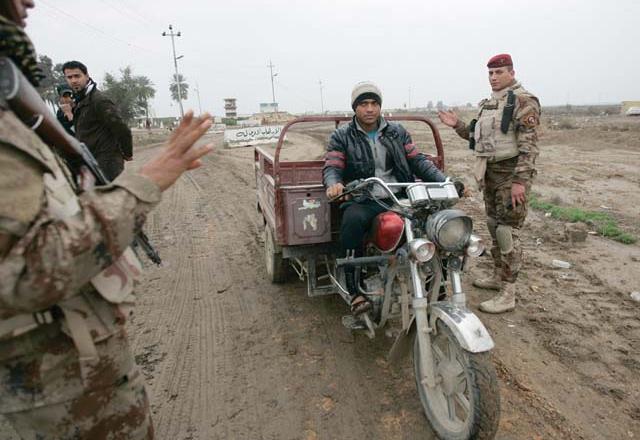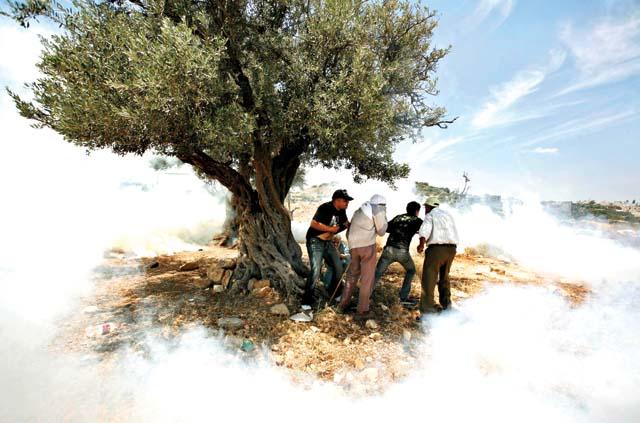CAIRO — Ousted president Mohamed Morsi was defiant as he went on trial Tuesday for a prison break during the 2011 uprising, as a top police official was murdered in another sign of Egypt’s instability.
The trial, and other violence in which a police guard was gunned down outside a Cairo church, came a day after the military backed army chief Field Marshal Abdel Fattah Al Sisi, who led Morsi’s ouster in July, to run for office in his place.
Morsi, dressed in a white prison uniform, gesticulated angrily from the glass cage in which he and 21 co-defendants were held.
“Who are you,” he demanded to know, adding: “Do you know who I am?”
“I am the president of the republic. Who are you? Let me hear your voice; I don’t hear you,” he shouted defiantly.
In response, a judge said: “I am the president of the Cairo Criminal Court.”
Among those in the dock was the supreme guide of Morsi’s now-banned Muslim Brotherhood, Mohamed Badie.
In all, 131 people are on trial, including dozens of members of the Muslim Brotherhood, the Islamist Palestinian movement Hamas and Lebanon’s Shiite group Hizbollah.
Most of them are being tried in absentia.
Reading the charges, a prosecutor said the “Muslim Brotherhood defendants coordinated with Hamas and Hizbollah to spread chaos and trigger the downfall of the state”.
“Eight hundred foreign militants and jihadists infiltrated through illegal tunnels and seized a 60-kilometre border stretch. They attacked security and government buildings and killed many police officers.”
He said “three prisons were attacked and more than 50 policemen and prisoners were killed, while more than 20,000 criminals escaped”.
The trial was later adjourned until February 22.
In the latest bloodletting, police General Mohamed Saeed was leaving his Cairo home when gunmen on a motorbike opened fire at him, hitting him in the head and the chest before fleeing, security officials said.
Saeed, who was the head of interior minister Mohamed Ibrahim’s “technical department,” died in hospital.
Hours later gunmen opened fire from a car at policemen guarding a church in the capital, killing one and wounding two. One was arrested, while two others fled on foot.
Since July, Egypt’s Christian community has faced several attacks, with pro-Morsi Islamists accusing them of backing his ouster.
Ibrahim himself was targeted by a car bomb in September, but he escaped unhurt.
Al Qaeda inspired group Ansar Beit Al Maqdis, or Partisans of Jerusalem, claimed that attack and has also said it was responsible for some of the deadliest bombings in Egypt since Morsi was deposed.
It said it carried out four bombings against police that killed six people Friday, a day before the third anniversary of the popular uprising that toppled long-time dictator Hosni Mubarak.
Precarious security situation
Tuesday’s shootings reiterate the precarious security situation prevailing across Egypt since then, which has worsened since July.
At least 1,400 people, mostly Morsi supporters, have been killed in a relentless crackdown on Islamists, according to Amnesty International, while scores of policemen and soldiers have also fallen to militant attacks across Egypt.
Since Thursday, at least 13 policemen have been killed across the country, while four soldiers were killed in Sinai, according to an AFP tally.
Morsi is already on trial for inciting the killings of opposition activists during his presidency and faces two other trials that have yet to begin.
Tuesday’s trial date was symbolic as it marked the third anniversary of the prison break from Wadi Natrum jail, which took place as the uprising against Mubarak approached a fever pitch.
Morsi and several Muslim Brotherhood leaders had been arrested by Mubarak’s security forces two days earlier to stop them from participating in protests called for January 28, 2011.
That so-called Friday of Rage was a turning point in Mubarak’s downfall, as thousands of people attacked and torched police installations, prompting the hated interior ministry’s forces to withdraw from the streets.
Morsi, Egypt’s first civilian and freely elected president, was ousted following massive protests against his one-year rule.
The wildly popular man behind that, army chief Sisi is now expected to put himself forward as a candidate in the presidential election to be held by mid-April.
To his supporters, Sisi is the best option for ending three years of instability that has helped to wreck the economy.
On Saturday, thousands poured into Cairo’s Tahrir Square to back a Sisi candidacy, after he said he required “public demand” to stand in the election.





















